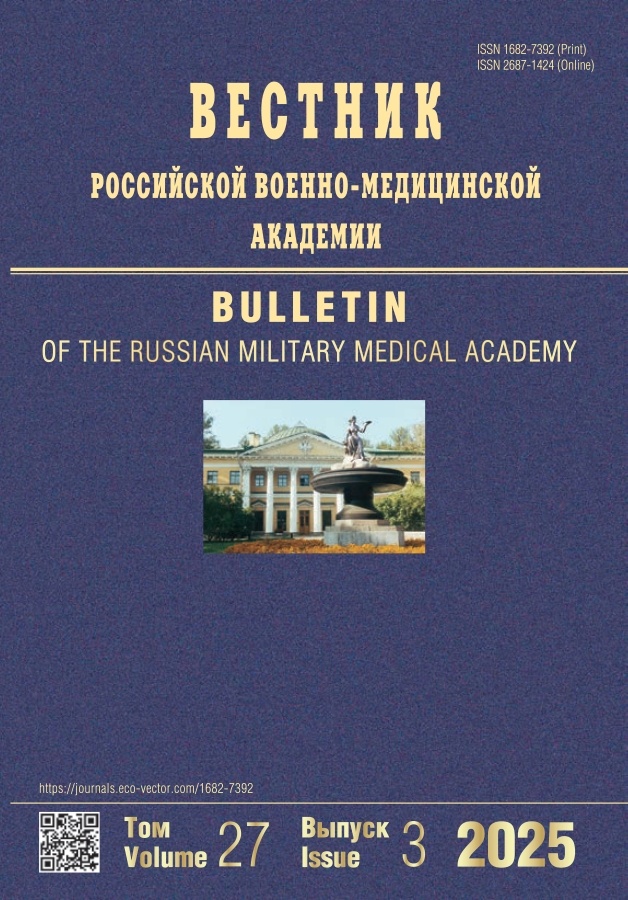Регистр пациентов, страдающих сердечной недостаточностью, в г. Санкт-Петербурге «персона-хсн»: промежуточные результаты
- Авторы: Кольцов А.В.1, Тыренко В.В.1
-
Учреждения:
- Военно-медицинская академия имени С. М. Кирова
- Выпуск: Том 25, № 4 (2023)
- Страницы: 595-602
- Раздел: Оригинальное исследование
- URL: https://journals.rcsi.science/1682-7392/article/view/253751
- DOI: https://doi.org/10.17816/brmma562963
- ID: 253751
Цитировать
Аннотация
Распространенность сердечной недостаточности приобретает глобальный характер, а количество пациентов неизменно увеличивается с каждым годом. Оценка количества больных, страдающих сердечной недостаточностью, в Санкт-Петербурге, а также их характеристика является одной из важнейших задач, для выполнения которой был разработан и инициирован Санкт-Петербургский регистр пациентов, страдающих хронической сердечной недостаточностью, «ПЕРСОНА-ХСН». Анализ данных осуществлялся за период с февраля по май 2023 г. Всего в выборку вошло 158 человек. Организацией, участвовавшей в пилотном проекте, выступил Госпиталь для ветеранов войн (г. Санкт-Перербург). Средний возраст пациентов составил 81,14 ± 11,39 лет. Количество баллов на основании шкалы оценки клинического состояния пациента 6,4 ± 2,6. Среднее значение фракции выброса левого желудочка 59,1 ± 11,1 %. Более 70 % больных имели фракцию выброса левого желудочка более 50 %, а у 23,4 % больных она и вовсе была выше 65 %. Среди коморбидной патологии преобладали: гипертоническая болезнь — 93 %, ишемическая болезнь сердца — 79,1 %, хроническая болезнь почек — 46,8 %, фибрилляция предсердий — 32,9 %, анемия — 31,6 %, сахарный диабет — 24,7 %. Высокий процент коморбидной патологии приводит к необходимости модифицировать проводимую терапию и использовать современные группы препаратов. Наиболее часто назначались бета-адреноблокаторы — 86,7 %, диуретики — 75,3 %, антагонисты минералокортикоидных рецепторов — 62 %, ингибиторы ангиотензин превращающего фермента — 61,4 %, блокаторы рецепторов к ангиотензину II — 39,2 %. Назначение современных групп препаратов (ангиотензиновые рецепторов-неприлизина ингибиторы и ингибиторов натрий-глюкозного ко-транспортера 2-го типа) составило 5,1 %. Обращает на себя внимание недостаточная преемственность в оказании медицинской помощи и низкая комплаентность пациентов к проводимой терапии, современной квадротерапии, учитывая ее высокую стоимость для пациента. В целом работоспособность регистровой платформы «ПЕРСОНА-ХСН» достаточно хорошая и позволяет более точно понять эпидемиологические аспекты проблемы сердечной недостаточности, решение которых даст возможность улучшить качество оказания медицинской помощи, выявить потребность в необходимых лекарственных препаратах и снизить показатели летальности и смертности. Однако требуется значительно больший набор пациентов и разный профиль медицинских учреждений для наиболее полного понимания проблемы сердечной недостаточности в Санкт-Петербурге, так как Госпиталь для ветеранов войн отражает лишь небольшую выборку пациентов преимущественно старческого возраста и большим количеством коморбидной патологии. Кроме того, необходимо дальнейшее развитие данного регистра, увеличение количества подключенных медицинских организаций, расширение количества анализируемых параметров, автоматизация процесса и, возможно, подключение искусственного интеллекта для анализа данных.
Полный текст
Открыть статью на сайте журналаОб авторах
Андрей Валентинович Кольцов
Военно-медицинская академия имени С. М. Кирова
Автор, ответственный за переписку.
Email: Andrewkoltsov83@gmail.com
ORCID iD: 0000-0001-9881-4587
SPIN-код: 8988-4988
кандидат медицинских наук
Россия, Санкт-ПетербургВадим Витальевич Тыренко
Военно-медицинская академия имени С. М. Кирова
Email: vadim_tyrenko@mail.ru
ORCID iD: 0000-0002-0470-1109
SPIN-код: 3022-5038
доктор медицинских наук, профессор
Россия, Санкт-ПетербургСписок литературы
- Агеев Ф.Т., Беленков Ю.Н., Фомин И.В., и др. Распространенность хронической сердечной недостаточности в Европейской части Российской Федерации — данные ЭПОХА-ХСН // Журнал Сердечная Недостаточность. 2006. Т. 7, № 3(37). С. 112–115.
- Терещенко С.Н., Галявич А.С., Ускач Т.М., и др. Хроническая сердечная недостаточность. Клинические рекомендации 2020 // Российский кардиологический журнал. 2020. Т. 25, № 25(11). С. 311–374. doi: 10.15829/1560-4071-2020-4083
- Мареев В.Ю., Фомин И.В., Агеев Ф.Т., и др. Клинические рекомендации. Хроническая сердечная недостаточность (ХСН) // Журнал Сердечная Недостаточность. 2017. Т. 18, № 1. С. 3–40. doi: 10.18087/rhfj.2017.1.2346
- World Medical Association. World Medical Association Declaration of Helsinki: Ethical Principles for Medical Research Involving Human Subjects // JAMA.2013. Vоl. 310, No. 20. Р. 2191–2194. doi: 10.1001/jama.2013.281053
- Tromp J., Ouwerkerk W., van Veldhuisen D.J., et al. A Systematic Review and Network Meta-Analysis of Pharmacological Treatment of Heart Failure With Reduced Ejection Fraction // JACC Heart Fail. 2022. Vоl. 10, No. 2. P. 73–84. doi: 10.1016/j.jchf.2021.09.004
- McMurray J.J.V., Packer M., Desai A.S., et al. Angiotensin-neprilysin inhibition versus enalapril in heart failure // N Engl J Med. 2014. Vоl. 371, No. 11. P. 993–1004. doi: 10.1056/NEJMoa1409077
- Fitchett D., Zinman B., Wanner C., et al. Heart failure outcomes with empagliflozin in patients with type 2 diabetes at high cardiovascular risk: results of the EMPA-REG OUTCOMER trial // Eur Heart J. 2016. Vоl. 37, No. 19. Р. 1526–1534. doi: 10.1093/eurheartj/ehv728
- Zinman B., Wanner C., Lachin J.M., et al. Empagliflozin, Cardiovascular Outcomes, and Mortality in Type 2 Diabetes // N Engl J Med. 2015. Vоl. 373, No. 22. Р. 2117–2128. doi: 10.1056/NEJMoa1504720
- Батюшин М.М. Дапаглифлозин и профилактика неблагоприятных исходов при хронической болезни почек: результаты исследования DAPA-CKD // Терапевтический архив. 2021. Т. 93, № 6. С. 713–723. doi: 10.26442/00403660.2021.6.200891
- Салухов В.В., Халимов Ю.Ш., Шустов С.Б., Попов С.И. Ингибиторы SGLT2 и почки: механизмы и основные эффекты у больных сахарным диабетом 2 типа // Сахарный диабет. 2020. Т. 23, № 5. С. 475–491. doi: 10.14341/DM12123
- Управление Федеральной службы государственной статистики по г. Санкт-Петербургу и Ленинградской области (Петростат). Возрастно-половой состав населения Санкт-Петербурга на 1 января 2021 года: статистический бюллетень. Санкт-Петербург: Петростат, 2021. 57 с.
Дополнительные файлы












